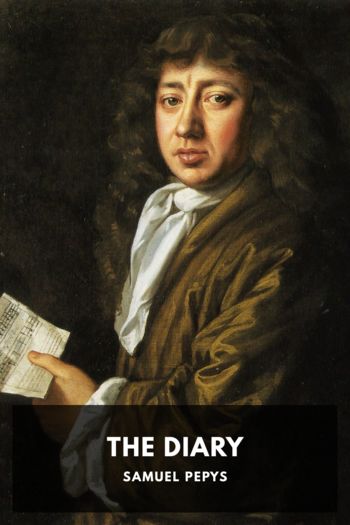The Diary, Samuel Pepys [e reader books TXT] 📗

- Author: Samuel Pepys
Book online «The Diary, Samuel Pepys [e reader books TXT] 📗». Author Samuel Pepys
See January 17th, 1668. ↩
The first part of the entry for April 20th is among the rough notes, and stands as follows: “Monday 20. Up and busy about answer to Committee of Accounts this morning about several questions which vexed me though in none I have reason to be troubled. But the business of The Flying Greyhound begins to find me some care, though in that I am wholly void of blame.” This may be compared with the text. ↩
Sir William Hooker, grocer. Sheriff of London in 1665, afterwards knighted, and Lord Mayor in 1674. His daughter was Anne, who married Sir John Lethieulier, of Sutton Place, Kent, Sheriff of London in 1674. —B. ↩
From sitting as a member pending the impeachment. —B. ↩
At Romney, which Henry Brouncker represented. —B. ↩
Sir Charles Berkeley, jun. was chosen in his room. In the sea-fight off Southwold Bay on June 3rd, 1665, the English triumphed over the Dutch, but the very considerable victory was not followed up. During the night, while the Duke of York slept, Henry Brouncker, his groom of the bedchamber, ordered the lieutenant to shorten sail, by which means the progress of the whole fleet was retarded, the Duke of York’s being the leading ship. The duke affirmed that he first heard of Brouncker’s unjustifiable action in July, and yet he kept the culprit in his service for nearly two years after the offence had come to his knowledge. After Brouncker had been dismissed from the duke’s service, the House of Commons ejected him. The whole matter is one of the unsolved difficulties of history. See Lister’s Life of Clarendon, ii, 334, 335. ↩
The famous Cock tavern (formerly the Cock and Bottle) in Fleet Street, opposite Middle Temple Gate, was pulled down to make room for the Law Courts branch of the Bank of England (erected 1888). Some of the old fittings were removed to No. 22 on the south side of the street, where the revived Cock was opened in 1888. ↩
Nicholas Fouquet, Surintendant des Finances in France, had built at Vaux a house which surpassed in magnificence any palace belonging to Louis XIV, prior to the erection of Versailles, and caused much envy to all the Court, especially to Colbert. “On voyait partout dans cette maison les armes at la devise de Fouquet; c’est un ecureuil, avec ces paroles, Quò non ascendant? ‘Où ne monterai-je point?’ Le Roi se les fit expliquer. L’ambition de cette devise ne servit pas à apaiser le monarque. Les courtisans remarquèrent que l’ecureuil était peint partout poursuivi par un couleuvre, qui était les armes de Colbert!” Fouquet died at Pignerol in 1680, after nineteen years’ incarceration; and whilst Pepys was buying his books in London, Colbert had become prime minister in France, and Colbert’s brother ambassador in England. The viper had caught the squirrel! —B. ↩
Probably Los Claros Varones, The Celebrated Men, of Fernando del Pulgar, historiographer to Isabella and Ferdinand. He was ambitious to be thought the Plutarch of his nation, whence the title of his book. However, the book meant by Pepys may be, Varones ilustres del Nuevo Mundo, descubridores, conquistadores, pacificadores de las Indias Occidentales, by Fernando Pizarro y Orellana; printed at Madrid in 1639. —B. ↩
Balty St. Michel and his wife. ↩
The Baron de Bergeick? —B. ↩
Letitia Isabella, daughter of Sir John Smith, of Kent. Lord Robartes’s first wife was Lady Lucy, daughter of Robert Rich, second Earl of Warwick, the mother of Robert Robartes, here mentioned, who had married Sarah, daughter and heir of John Bodvile, of Bodvile Castle, in Caernarvonshire. He died, s. p., in 1681, while ambassador to Denmark, having assumed the title of Viscount Bodmin, upon his fathers elevation to the earldom of Radnor, in 1679. —B. See note 2152. ↩
William Wintershall, or Wintersell, was one of the original actors under Killigrew, at Drury Lane, and played the king in The Humourous Lieutenant, at the opening of that theatre. He was also Sir Amorous in Ben Jonson’s Silent Woman; Subtle in the Alchemist; the king in Henry the Fourth, etc. Downes (Roscius Anglicanus, p. 17) says, “Mr. Wintersell was good in tragedy, as well as in comedy, especially in Cokes, in Bartholomew Fair, that the famous comedian, Nokes, came, in that part, far short of him.” He was an excellent instructor, and died in July, 1679. One of his best comic parts, to the last, was Master Slender, which John Dennis praises highly. ↩
“April 2. The Resolution, a new ship, is rigging at Harwich.”
“May 6. The Resolution has sailed to Erith.”
Calendar of State Papers, 1667–68, pp. 324, 377↩
Was this Benjamin Vandeputt, draper, Sheriff of London in 1685?





Comments (0)